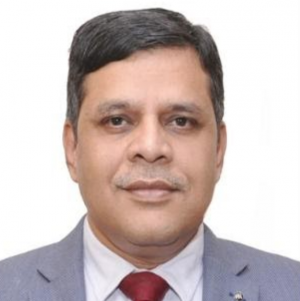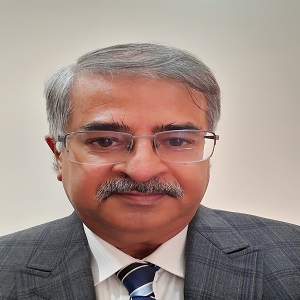
Prof. Ajay A. Deshpande is currently the Adjunct Professor at the Centre for Policy Studies, Indian Institute of Technology, Bombay. He also served as the Expert Member, National Green Tribunal during March 2013 to July 2017. He is currently a part-time member of the Compliance Review Panel of Asian Development Bank, Manila. He has also worked in several senior positions in Maharashtra Pollution Control Board and Maharashtra State Road Development Corporation. He has also worked as Environmental Specialist at Water and Power Consultancy Services (I) Ltd (WAPCOS) at New Delhi from 1992-1997. He was Chairman of the committee which was constituted under orders of NGT for Monitoring the compliance of HW regulations in the country. During his tenure at MPCB several initiatives of capacity building including expansion of environmental monitoring program, theme-based training program, research and development division, computerisation, auto-renewal, MPCB fellowship and State environmental policy were initiated. He was also invited to deliver lectures at several national and international programs, including one at Harvard University.
Topics:
1. Circular economy: Critical analysis and also, sectoral applications
2. Economic instruments as policy intervention for environmental protection
3. Critical analysis of Extended Producer Responsibility as a policy instrument for improved recycling of wastes
4. Environmental governance: Need of evidence based policy development and enforcement
5. Critical analysis of ESG as a policy instrument in finance sector in the Indian context:
6. Broadening the scope of Social impact assessment in Indian Environmental clearance framework for emerging issues including gender. GBV, heritage, landscape etc
7. Policy approach for environmental restoration: Polluter pays principle: A critical analysis of some NGT judgments
Research Area: Environment, Energy and Natural Resources
Description: These research topics are part of overall environmental governance approaches which are being deliberated. India is experiencing rapid changes in its environmental regimes and policy approaches which are many times advoc and also as a response to particular challenges or specific judicial orders. However, any such interventions need to be based on evidence based policy studies. It is proposed that the research work would be carried out both on theoretical framework and also using the field level studies including stakeholder engagement.
– Ph.D. in Environmental Engineering from Indian Institute of Delhi (1997)
– Master’s Degree in Environmental Engineering from Walchand College of Engineering (1990).
– An Undergraduate Degree from the Walchand College of Engineering, Sangli (1988)

Dr. Sundeep Oberoi have 36 years of industry, research and entrepreneual experience in diverse areas of Information and Communication Technology. His experience covers a wide spectrum of experience in Delivery Management of large and critical programmes, technology development, product development, business development, system integration and management of research laboratories. He have a Ph.D. in Computer Science from I.I.T Bombay, an M.Tech in Computer Science from I.I.T. Delhi and a B.Tech in Chemical Engineering from I.I.T. Kanpur.
He was responsible for the establishment of the I.I.T. Bombay – Tata Infotech Research Laboratory in 1997 and was its first head.
He retired from the Tata Group in November 2020 and prior to retirement served as the Global Head for the Cybersecurity Business Unit of Tata Consultancy Services and was recognized as #4 in the top 25 Cybersecurity Executives of 2020 – “The IT Services Report”.
He was responsible for security execution in several large Government of India projects like the AWAN project of Indian Army, Passport Seva Project, MCA-21, security of EVMs and many other important projects.
My research interests broadly fall into
• Digital Societies
• Technology and Society
And I am also interested in how sometimes technologies might create or mitigate
Structural Inequalities
There have been rapid advances in the field of Information Technology over the past few decades. The dramatic drop in price of computing power and the ubiquitous availability of communications has completely transformed how information technology is applied and deployed.
These advances are resulting in a phenomenon that may be termed “softwarization of everything”. While this is not a new phenomenon, it has significantly accelerated and percolated into almost every domain.
Simultaneously there is a significantly higher participation of the private sector in areas that used to be the preserve of Governments or Government owned corporations. The telecommunications sector is a good example of that.
These trends pose significant challenges to the policy maker. Firstly the rapid evolution of technology and the ability for it to be deployed instantly creates a situation where technology can be and is deployed before there is sufficient experience with its effects. Secondly software models are just very rough abstractions of systems and create possibilities that do not exist in the real world. Thirdly the fact that there is so much participation by the private sector in critical infrastructure makes it important that they are represented at the policy formulation table.
The first problem is how do we ensure that a technology does not have unintended negative consequences and if such consequences arise how are they to be dealt with. The second problem is how do we ensure that systems are trustworthy and meet the expectations of their stakeholders.
My current research interests broadly are:
• Policy aspects of technology deployment at scale
• Policy aspects of Data Governance and Management
• Standards as a vehicle for policy implementation
• Trustworthiness of systems and systems-of-systems
• Cybersecurity
– Ph.D. in Computer Science, I.I.T Bombay
– M.Tech in Computer Science from I.I.T. Delhi
– B.Tech in Chemical Engineering from I.I.T. Kanpur
PS-632: Contemporary issues in Data Policy and Governance
The importance of data in almost every activity in today’s world is well recognized. We are generating and using vast quantities of data. This has raised several technical, economic and policy questions which impact the lives and livelihoods of every single person. These issues need formal academic study to evolve informed strategies to reap the benefits of data and avoid the harms.